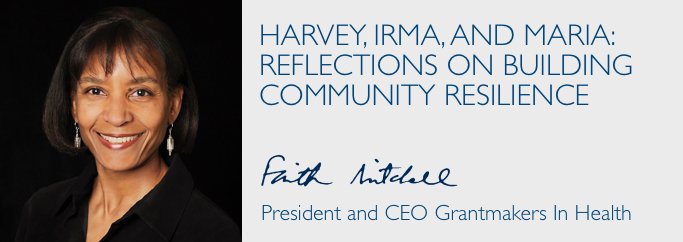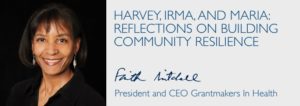
In the immediate aftermath of natural disasters like hurricanes Harvey, Irma, and Maria, people require help with food, water, physical injuries, housing, and other survival concerns. Longer term, their needs are more complex—and less visible. Extended mental health and trauma services are essential. In the seven years following Hurricane Katrina, for example, the rate of diagnosable mental health problems in the New Orleans area jumped by 9 percent. In addition, communities need help with sustained recovery and improved resilience.
Resilience is the capacity of individuals, communities, institutions, businesses, and systems to survive, adapt, and grow no matter the kinds of chronic stresses and acute shocks they experience. As GIH board chair Jandel Allen-Davis recently observed, “Communities with the strongest social capital are the most resilient.” Both before and after disasters, communities fare better when there are strong ties within families, and strong connections between families, local organizations, and government agencies. For example, when families have good internal communication, vulnerable elders are less likely to be stranded alone, perhaps to die, when the power and water go off. Likewise, when communities are supported by effective local organizations and responsive government agencies, it is more likely that their post-disaster medical and behavioral health needs will be recognized and quickly responded to.
Conversely, vulnerable communities fare poorly when disaster strikes. The qualities that make them vulnerable—residential segregation, limited economic resources, marginal political voice, and weak infrastructure—impede their ability to recover. Thus, people with the fewest resources—impoverished, disabled, elderly, undocumented, homeless, and rural residents—are hit the hardest.
Philanthropy has learned valuable lessons about how to build long-term community resilience. Successful strategies often include:
- developing disaster preparedness and response plans for elderly residents;
- supporting resident-led community planning processes for affected neighborhoods;
- helping reduce the impact of trauma on children and families;
- strengthening authentic leadership and financial management in community-serving organizations;
- considering different kinds of funding, like general operating support and capacity building grants; and
- pursuing partnerships with local, state, and federal public agencies.
Equity is an intrinsic part of building community resilience, just as it should be part of the recovery process. Acknowledging and addressing racial, ethnic, and economic inequities that existed before the disaster is essential. After Katrina, recovery was hampered in New Orleans due to lack of attention to long-standing racial, ethnic, and economic divisions. Health funders can enhance resilience and support equity by ensuring that diverse community voices are represented in policy decisions; supporting the infrastructure of grassroots, service, and advocacy organizations; and strengthening safety net health care providers. For all the destruction they wreak, disasters represent important opportunities for making long-term investments in community stability and finding new ways to work with communities and their leaders.

